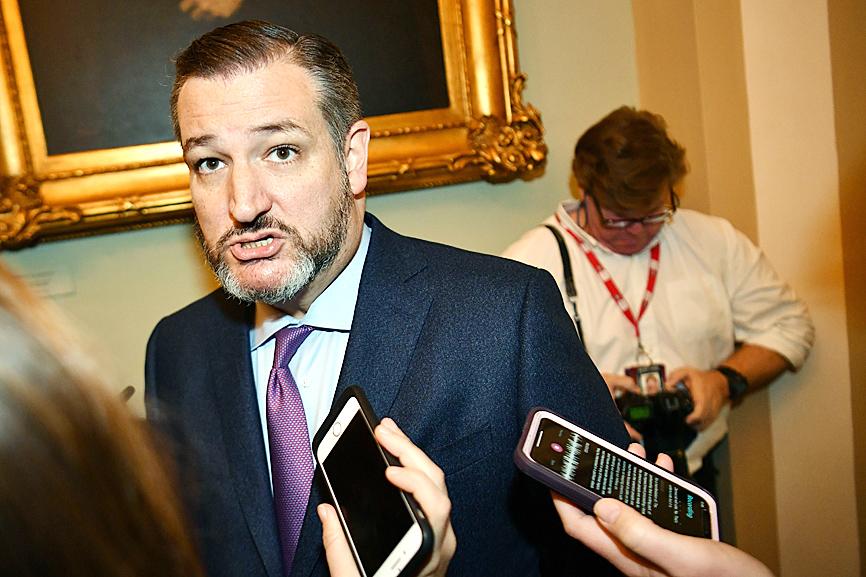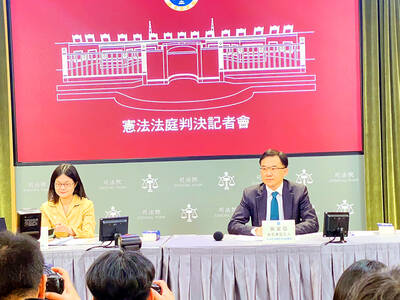China yesterday announced sanctions against US officials, including senators Marco Rubio and Ted Cruz, in a largely symbolic attempt to retaliate over Washington’s moves to punish Beijing for its treatment of ethnic minorities in the Xinjiang region.
Chinese Ministry of Foreign Affairs spokesperson Hua Chunying (華春瑩) said sanctions against the four officials would begin yesterday, without elaborating.
Hua listed Rubio and Cruz — both Republicans and high-profile critics of China — as targets of the measures, in addition to US Ambassador for Religious Freedom Sam Brownback, US Representative Chris Smith and the Congressional-Executive Commission on China.

Photo: AFP
“Xinjiang is China’s internal affairs and the US has no right to interfere,” Hua said at a regular briefing in Beijing. “We urge the US to immediately withdraw its wrong decisions, stop interfering in China’s internal affairs or undermining China’s interests. We will make further reactions based on the development of the situation.”
The move comes after the US sanctioned a top member of the Chinese Communist Party (CCP) and three other officials over alleged human rights abuses in Xinjiang.
The individuals sanctioned by the US include Xinjiang Uighur Autonomous Region CCP Secretary Chen Quanguo (陳全國), a member of the CCP’s 25-member politburo; CCP Secretary of the Xinjiang Political and Legal Committee Zhu Hailun (朱海侖); Xinjiang Public Security Bureau Director Wang Mingshan (王明山); and Huo Liujun (霍留軍), a former top official in Xiinjiang’s police force.
The tit-for-tat exchanges appeared calibrated to keep the disputes from further escalating and disrupting other aspects of ties between the world’s two largest economies, such as their “phase one” trade deal.
The US moves were largely symbolic, since both groups of US and Chinese officials were unlikely to have much financial or legal exposure to each other’s countries.
“This is an equivalent action targeting the main people responsible for what happened with sanctioning Chinese officials over Xinjiang,” said Bo Zhengyuan, partner at Beijing-based research firm Plenum. “The move gives the US a sense of how China will react when potential sanctions related to the Hong Kong Autonomy Act [HKAA] is announced. Beijing has shown that it will hit back with proportional actions, which is worrisome as the HKAA includes sanctions on entities such as financial institutions.”
The list of US officials targeted by China notably included no US officials as senior as Chen.
Rubio introduced the Senate version of US legislation calling for sanctions against Xinjiang officials, one of several measures critical of China that Cruz has also supported.
The commission, a frequent target of criticism from Beijing, had earlier this year issued a report saying the country was using forced labor as part of an official policy to suppress and control its ethnic minorities.
Hua yesterday also dismissed a tweet reposted by the US embassy in Beijing, including an image suggesting Chinese labor abuses in Xinjiang.
“We oppose they use such inferior lies to smear and attack China,” Hua said. “It shows some American people have no bottom line in attacking China.”
Additional reporting by staff writer

TRAGEDY STRIKES TAIPEI: The suspect died after falling off a building after he threw smoke grenades into Taipei Main Station and went on a killing spree in Zhongshan A 27-year-old suspect allegedly threw smoke grenades in Taipei Main Station and then proceeded to Zhongshan MRT Station in a random killing spree that resulted in the death of the suspect and two other civilians, and seven injured, including one in critical condition, as of press time last night. The suspect, identified as a man surnamed Chang Wen (張文), allegedly began the attack at Taipei Main Station, the Taipei Fire Department said, adding that it received a report at 5:24pm that smoke grenades had been thrown in the station. One man in his 50s was rushed to hospital after a cardiac arrest

PUBLIC SAFETY: The premier said that security would be tightened in transport hubs, while President Lai commended the public for their bravery The government is to deploy more police, including rapid response units, in crowded public areas to ensure a swift response to any threats, President William Lai (賴清德) said yesterday after a knife attack killed three people and injured 11 in Taipei the previous day. Lai made the remarks following a briefing by the National Police Agency on the progress of the investigation, saying that the attack underscored the importance of cooperation in public security between the central and local governments. The attack unfolded in the early evening on Friday around Taipei Main Station’s M7 exit and later near the Taipei MRT’s Zhongshan

ON ALERT: Taiwan’s partners would issue warnings if China attempted to use Interpol to target Taiwanese, and the global body has mechanisms to prevent it, an official said China has stationed two to four people specializing in Taiwan affairs at its embassies in several democratic countries to monitor and harass Taiwanese, actions that the host nations would not tolerate, National Security Bureau (NSB) Director-General Tsai Ming-yen (蔡明彥) said yesterday. Tsai made the comments at a meeting of the legislature’s Foreign Affairs and National Defense Committee, which asked him and Minister of National Defense Wellington Koo (顧立雄) to report on potential conflicts in the Taiwan Strait and military preparedness. Democratic Progressive Party (DPP) Legislator Michelle Lin (林楚茵) expressed concern that Beijing has posted personnel from China’s Taiwan Affairs Office to its

‘ILLEGAL RULING’: The KMT and the TPP slammed the Constitutional Court judgement, saying it contravened the law and was trying to clear the way for a ‘green dictatorship’ The Constitutional Court yesterday ruled that amendments to the Constitutional Court Procedure Act (憲法訴訟法) passed by the Legislative Yuan last year are unconstitutional, as they contravene due legislative process and separation of powers. The Legislative Yuan on Dec. 20 last year passed amendments stipulating that no fewer than 10 grand justices must take part in deliberations of the Constitutional Court, and at least nine grand justices must agree to declare a law unconstitutional. The Executive Yuan on Jan. 2 requested that lawmakers reconsider the bill, but the Legislative Yuan, under a combined majority of Chinese Nationalist Party (KMT) and Taiwan People’s Party